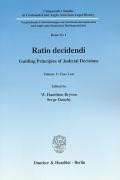
Ratio decidendi - Guiding Principles of Judicial Decisions 1
Kurzinformation
inkl. MwSt. Versandinformationen
Artikel zZt. nicht lieferbar
Artikel zZt. nicht lieferbar

Beschreibung
Although the problem of ratio decidendi concerns the essence of law and justice, very little comparative work between the Continental and Anglo-American legal systems has been done on the topic. Legal literature often repeats that it is one of the sharpest points of contrast between the two legal cultures. Within the English speaking legal system, multiple opinions, both concurring and dissenting, prevail where dissent among Continental judges only occurs behind closed doors: the published decision indeed is always presented as the single and incontestable opinion of the whole court. Historical reasons are generally put forward to explain that contrast. Where in the Anglo-American Common Law system judges are asked - and always have been asked - to present the materials and reasons upon which they based their judicial opinions, in Ancien Régime continental Europe it was not considered necessary to formulate the reasons of a decision and in most courts of the European Continent it was even formally forbidden to the judges, until the end of the eighteenth century, to write down or even communicate orally "the secrets of their discussions and deliberations". To comparatists, this reveals two different cultures among judges and lawyers. In Continental Europe there is much emphasis on the idea of judging as a science which can be learned and reproduced with an impersonal rigour. The Anglo-American judge is not considered to be such a trained scientist, he is merely a practised craftsman. Can the history of ratio decidendi - but also the history of law and justice from the Middle Ages to the nineteenth century - therefore be reduced to a total contradiction between two legal cultures? von Bryson, W. Hamilton
Produktdetails

So garantieren wir Dir zu jeder Zeit Premiumqualität.
Über den Autor

- Kartoniert
- 343 Seiten
- Erschienen 2016
- Nomos

- Gebunden
- 384 Seiten
- Erschienen 2019
- Mohr Siebeck

- Gebunden
- 363 Seiten
- Erschienen 2018
- Nomos

- Gebunden
- 508 Seiten
- Erschienen 2019
- Mohr Siebeck

- hardcover
- 594 Seiten
- Erschienen 2014
- Mohr Siebeck

- paperback
- 424 Seiten
- Erschienen 2019
- Springer

- Hardcover
- 60 Seiten
- Erschienen 1989
- RLPG/Galleys

- Kartoniert
- 450 Seiten
- Erschienen 2020
- Nomos

- Taschenbuch
- 230 Seiten
- Erschienen 2009
- BPS Blackwell

- Kartoniert
- 397 Seiten
- Erschienen 2018
- Nomos

- Gebunden
- 427 Seiten
- Erschienen 2022
- Mohr Siebeck

- Gebunden
- 506 Seiten
- Erschienen 2020
- Mohr Siebeck


































